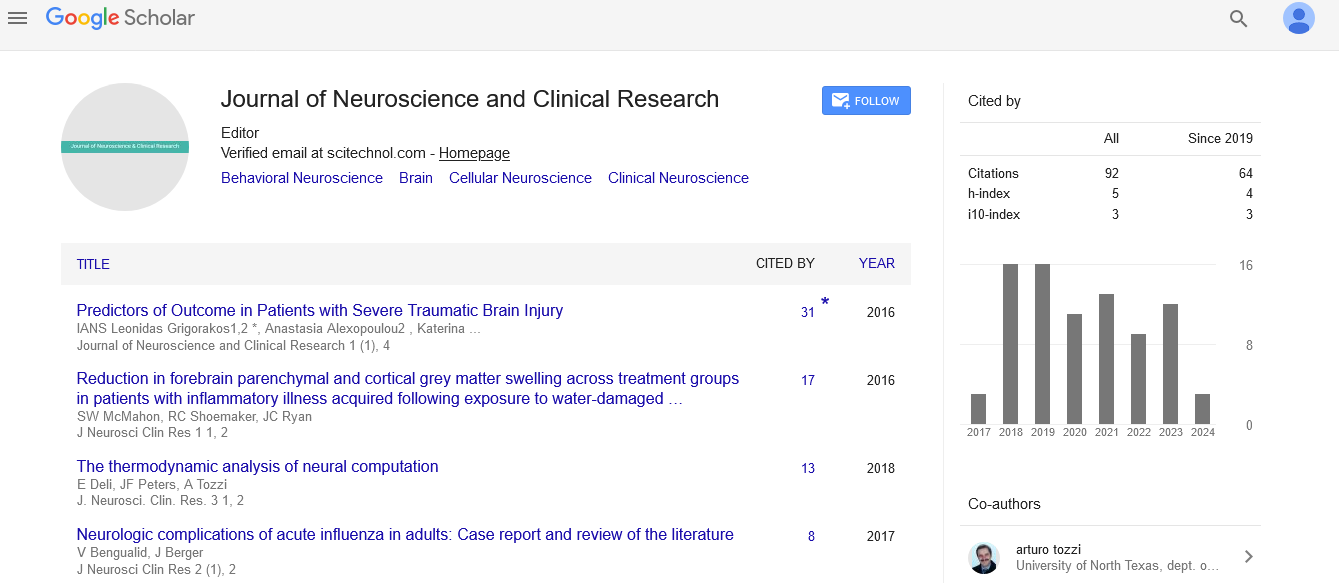Short Communication, J Neurosci Clin Res Vol: 8 Issue: 2
Dietary Strategies for Managing Parkinson's Disease Symptoms
Jason Longhurst*
Department of Physical Therapy and Athletic Training, Saint Louis University, Saint Louis, United States of America
*Corresponding Author: Jason Longhurst
Department of Physical Therapy and
Athletic Training, Saint Louis University, Saint Louis, United States of America
E-mail: jasonl@gmail.com
Received date: 29 May, 2023, Manuscript No. JNSCR-23-106771;
Editor assigned date: 31 May, 2023, PreQC No. JNSCR-23-106771 (PQ);
Reviewed date: 14 June, 2023, QC No. JNSCR-23-106771;
Revised date: 21 June, 2023, Manuscript No. JNSCR-23-106771 (R);
Published date: 28 June, 2023, DOI: 10.4172/Jnscr.1000160
Citation: Longhurst J (2023) Dietary Strategies for Managing Parkinson's Disease Symptoms. J Neurosci Clin Res 8:2.
Description
Parkinson's disease is a neurodegenerative disorder that affects millions of people worldwide. While medications and therapies play an important role in managing the symptoms, emerging studies suggest that dietary strategies can also have a positive impact on Parkinson's disease [1]. By making conscious choices about what one can eat, one can potentially alleviate some symptoms and improve overall well-being.
Importance of a balanced diet
Maintaining a balanced diet is essential for everyone, but it becomes even more essential for individuals with Parkinson's disease. A balanced diet provides the necessary nutrients to support overall health and minimise complications [2]. Focus on consuming a variety of fruits, vegetables, whole grains, lean proteins, and healthy fats. Including foods rich in antioxidants, such as berries, spinach, and nuts, can help reduce oxidative stress, which is known to contribute to the progression of Parkinson's disease [3].
Role of gut health
Emerging studies suggest a connection between gut health and Parkinson's disease. The gut microbiome, the community of microorganisms residing in our digestive system, plays a vital role in overall health. Consuming a diet that supports a healthy gut can positively impact Parkinson's symptoms [4]. Include probiotic-rich foods like yoghurt, kefir, sauerkraut, and kimchi to promote a healthy gut microbiome. Additionally, incorporating prebiotic foods like garlic, onions, and bananas can provide nourishment for beneficial gut bacteria.
Managing medication interactions
Several medications used to manage Parkinson's disease symptoms can interact with certain foods and nutrients. It's essential to be mindful of these interactions to optimise medication effectiveness [5]. For example, consuming high-protein foods at the time of taking levodopa can reduce its absorption. Consider spreading your protein intake throughout the day and focusing on lower-protein meals when taking medication. Consult with a healthcare professional or a registered dietitian for personalised advice on managing medication interactions [6].
Potential benefits of certain nutrients
Certain nutrients have shown promise in managing Parkinson's disease symptoms. For example, omega-3 fatty acids found in fatty fish, flaxseeds, and walnuts possess anti-inflammatory properties that may help reduce neuroinflammation associated with Parkinson's disease [7]. Additionally, vitamin D, which can be obtained through sunlight exposure or fortified foods, may play a role in supporting brain health [8]. However, it's important to consult with a healthcare professional before starting any new supplements.
Hydration and medication absorption
Adequate hydration is essential for everyone, including individuals with Parkinson's disease. Good hydration can aid in the absorption and effectiveness of medications [9]. Aim to drink plenty of water throughout the day, as dehydration can worsen symptoms such as constipation and orthostatic hypotension. If swallowing difficulties arise, consider consuming hydrating foods like soups, smoothies, and juicy fruits [10].
Conclusion
While diet alone cannot cure Parkinson's disease, adopting specific dietary strategies can complement medical treatments and help manage symptoms effectively. A balanced diet rich in antioxidants, focused on gut health, and mindful of medication interactions can have a positive impact on overall well-being. Additionally, incorporating nutrients such as omega-3 fatty acids and vitamin D may offer specific benefits. Remember to consult with healthcare professionals, including neurologists and registered dietitians, to receive personalised recommendations tailored to individual needs. By making informed dietary choices, individuals with Parkinson's disease can enhance their quality of life and overall health.
References
- Bloem BR, Okun MS, Klein C (2021) Parkinson's disease. The Lancet 397(10291):2284-303.
[Crossref] [Googlescholar][PubMed]
- Kalia LV, Lang AE (2015) Parkinson's disease. The Lancet 386(9996):896-912.
[Crossref] [Googlescholar][PubMed]
- Samii A, Nutt JG, Ransom BR (2004) Parkinson's disease. The Lancet 363(9423):1783-93.
[Crossref] [Googlescholar][PubMed]
- Lees AJ, Hardy J, Revesz T (2009) Parkinson's disease. The Lancet 373(9680):2055-66.
[Crossref] [Googlescholar][PubMed]
- Lang AE, Lozano AM (1998) Parkinson's disease. N Engl J Med 339(16):1130-43.
[Crossref] [Googlescholar][PubMed]
- Marsden CD (1994) Parkinson's disease. J Neurol Neurosurg Psychiatry 57(6):672.
[Crossref] [Googlescholar][PubMed]
- Dauer W, Przedborski S (2003) Parkinson's disease: mechanisms and models. Neuron 39(6):889-909.
[Crossref] [Googlescholar][PubMed]
- Braak H, Braak E (2000) Pathoanatomy of Parkinson’s disease. J Neurol 247:II3-10.
[Crossref] [Googlescholar][PubMed]
- Tolosa E, Wenning G, Poewe W (2006) The diagnosis of Parkinson's disease. Lancet Neurol 5(1):75-86.
[Crossref] [Googlescholar][PubMed]
- Cummings JL (1992) Depression and Parkinson's disease: a review. Am J Psychiatry 149(4):443-54.
[Crossref] [Googlescholar][PubMed]
 Spanish
Spanish  Chinese
Chinese  Russian
Russian  German
German  French
French  Japanese
Japanese  Portuguese
Portuguese  Hindi
Hindi 